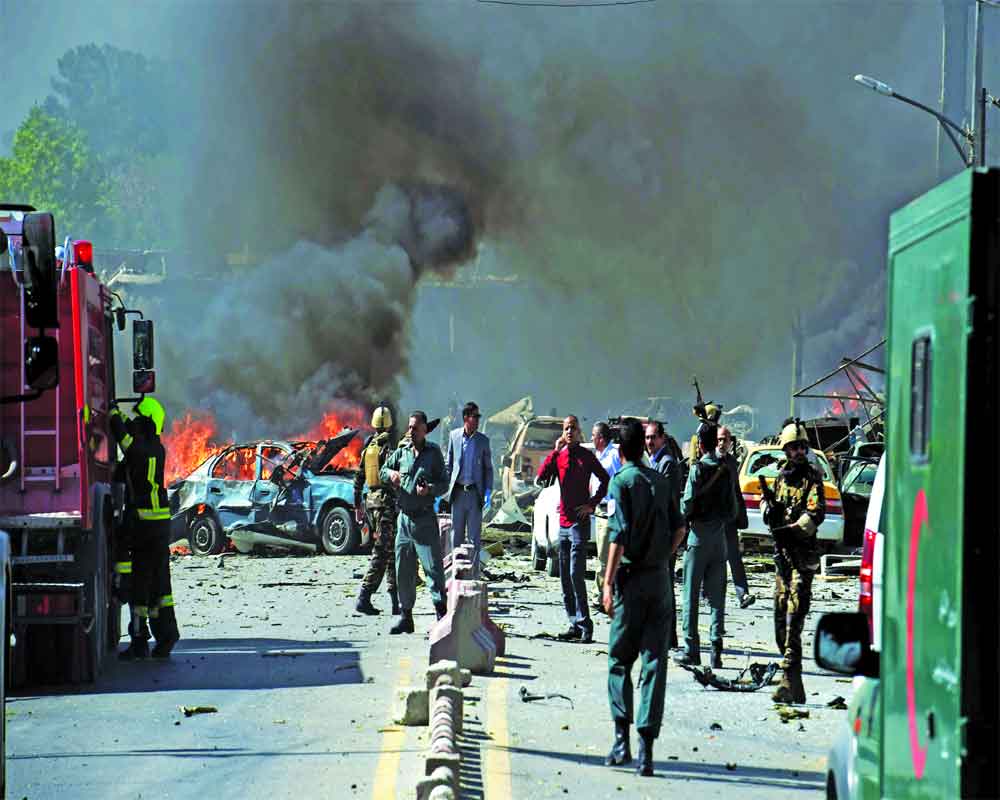Will Taliban be able to defeat a resurgent Islamic State of Khorasan Province, which is carrying out terror strikes to undermine the regime?
The continuing explosions in Afghanistan — the latest at the time of writing being the one that killed at least three in Kabul on September 21, 2022 — have been attributed to or claimed by the Islamic State of Khorasan Province (ISKP), an affiliate of the Daesh or Islamic State. Many also call the organisation, which made its appearance in Afghanistan in 2014 (2015, according to some), the Islamic State of Iraq and Syria- Khorasan (ISIS-K).
These blasts and other terror strikes are aimed at undermining the Taliban regime in Afghanistan. As Asfandyar Mir, a senior expert at the US Institute of Peace, points out in a Wilson Centre paper, dated October 8, 2021, “ISIS-K sees the Taliban as an irreconcilable enemy that needs to be militarily defeated.” While “sustained military hostilities” have aggravated the enmity between the organisations, “the main cause remains their sectarian difference”. The ISKP subscribes to the “Jihadi-Salafism ideology — and plays up the ‘purity’ of its anti-idolatry credentials, the Taliban subscribe to “an alternative Sunni Islamic sectarian school, the Hanafi madhhab,” which ISKP regards as “deficient”. The two groups also differ over the role of nationalism. The ISKP’s fierce rejection of it “runs counter to the Afghan Taliban’s aims of ruling over Afghanistan”.
The blasts and other forms of terror strike have, no doubt, seriously undercut the Taliban narrative that their rule has brought security to Afghanistan. They also raise the question whether the Taliban regime itself is secure. Of course, it is one thing to trigger explosions and quite another to defenestrate the Taliban regime. It is always difficult to prevent terror strikes including bomb blasts. The initiative lies with the perpetrators and Governments can only react post-facto. Preventive action can only be taken if advance information is available as a result of deep and extensive penetration of the organisation concerned by intelligence agencies, which, again would depend in a great measure on how porous or impenetrable the organisation is. Given the continuing frequency and spread of the blasts and other attacks by the ISKP, the Taliban have clearly not been able to penetrate it.
Inability to prevent terror strikes does not mean that the Taliban regime is set to collapse. It has a large army of trained fighters and has inherited the arms, ammunition, military aircraft and vehicles and combat infrastructure left behind by the United States. Nevertheless, the Taliban do face serious problems. Writing for the US Council of Foreign Relations’ Centre for Preventive Action, Seth G Jones, Harold Brown Chair and Director, Transnational Threats Project, Center for Strategic and International Studies, they do not control law and order outside most cities; nor have they been able to establish basic services. The economy is in shambles. As a report in The Economist datelined June 8, 2022, and titled ‘The Taliban Government has proved surprisingly good at raising money’, states, in “the last four months of 2021, the economy contracted by more than a third compared with the same period a year earlier. Private businesses have laid off about three-fifths of employees. Food prices are rising by 18% year on year. Families that were middle-class a year ago are surviving on a single meal a day. More than half the country’s people face acute hunger. Some have taken to selling organs or children.”
The same report, however, pointed out that the new Government’s finances were in much better shape than anybody expected — largely because of its ability to keep revenues flowing despite the obstacles facing it, which, in turn, is due to its experience in collecting taxes during their two decades as a rebel army and their crackdown on corruption in revenue collection following their ascent to power. This is important because it needs money to fight ISKP. It, however, is not just a question of money. ISKP has shown remarkable resilience. Sustained attacks by the US forces, the previous Afghan Government and the Taliban, from 2016 to 2021, had severely weakened it.
There, however, was a resurgence after the Taliban takeover. In a dispatch in The New York Times (datelined May 1, 2022) titled ‘With Spate of Attacks, ISIS Begins Bloody New Chapter in Afghanistan’, Christina Goldbaum states that since the Taliban seized power, the ISKP has grown in reach and expanded to nearly all of Afghanistan’s 34 provinces. She further cites Abdul Sayed, a security expert who tracks the ISKP and other jihadi groups, as saying that the ISKP carried out 119 attacks in Afghanistan in the last four months of 2021 against 39 in the corresponding period of 2020.
The ISKP has also doubled its strength in Afghanistan from around 2,000 to 4,000 since the Taliban’s return to power. This is both a result of escape/release of its fighters from prisons that followed, those disillusioned by Taliban and many of the former Afghan Government’s military and intelligence agency (the National Directorate for Security) personnel joining it, the last two perceiving it to be the most effective opponent to the Taliban. Clearly, the Taliban have a major problem at hand. So has the world. The establishment of their version of sharia rule worldwide through global terror strikes is an integral part of the ISKP’s agenda.
(The author is Consulting Editor, The Pioneer. The views expressed are personal.)


























